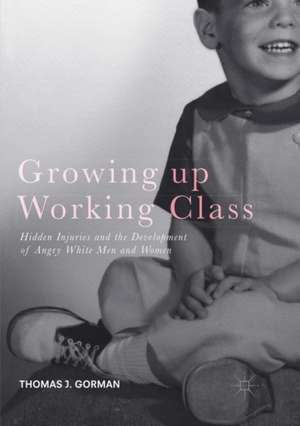Growing up Working Class: Hidden Injuries and the Development of Angry White Men and Women
Autor Thomas J. Gormanen Limba Engleză Paperback – 12 aug 2018
This enlightening auto-ethnography examines how social class (and other social institutions and structures) affect how people grow up. Primarily, the book investigates how American children and young adults are impacted by the "hidden injuries" of class, and offers a rich description of how these injuries manifest and curdle later in life. Thomas J. Gorman provides sociological explanations for the phenomenon of the so-called "angry white man," and engages with this phenomenon as it relates to the rise of recent populist political figures such as Donald J. Trump. He also examines how and why white working class people tend to lash out at the wrong social forces and support political action that works against their own interests. Finally, the book demonstrates the connections between working-class attitudes toward schooling, sports, politics, and economics.
Preț: 172.77 lei
Nou
Puncte Express: 259
Preț estimativ în valută:
33.06€ • 34.68$ • 27.52£
33.06€ • 34.68$ • 27.52£
Carte tipărită la comandă
Livrare economică 28 martie-03 aprilie
Preluare comenzi: 021 569.72.76
Specificații
ISBN-13: 9783319865041
ISBN-10: 3319865048
Pagini: 266
Ilustrații: XVII, 266 p.
Dimensiuni: 148 x 210 mm
Ediția:Softcover reprint of the original 1st ed. 2017
Editura: Springer International Publishing
Colecția Palgrave Macmillan
Locul publicării:Cham, Switzerland
ISBN-10: 3319865048
Pagini: 266
Ilustrații: XVII, 266 p.
Dimensiuni: 148 x 210 mm
Ediția:Softcover reprint of the original 1st ed. 2017
Editura: Springer International Publishing
Colecția Palgrave Macmillan
Locul publicării:Cham, Switzerland
Cuprins
1. Introduction.- 2. Where Does the Concrete End?: The Local Context of the Hidden Injuries of Class.- 3. Education: The Hidden Injuries of Class Begin.- 4. The Injuries Continue Into Adulthood.- 5. Friends and Sports: The Injuries Escalate and Become Personal.- 6. Structure and Culture: The Macro Context of Growing Up Working Class.- 7. Facebook: A Reunion of Angry (and Not so Angry).- 8. Conclusions: Hard and Settled Living, Self-Confidence, and The Development of Angry (and Not so Angry) White Working-Class Men and Women.
Recenzii
“The book provides rich potential to explore the nuances of racially homogenous class experiences and related perspectives around self-esteem, education, relationship formation, family trauma (e.g., alcoholism), and other hidden injuries of class.” (Meghan Burke, Contemporary Sociology, Vol. 48 (5), September, 2019)
“Nostalgia rolled back to me faster than the B-express train as I read Queens College sociologist Thomas J. Gorman’s Growing Up Working Class. … the book is erected around a compelling thesis: How the ‘hidden injuries of class’ follow working-class kids into adulthood … . what I admire most in Gorman’s book are his astute autobiographical observations. He successfully evokes the claustrophobic, frustrating, exhilarating, painful, sometimes menacing, and just plain loud world of working-class New York.” (Alfred Lubrano, Journal of Working Class Studies, Vol. 3 (2), December, 2018)
“Gorman’s book … is an autoethnography embedded in sociological theories and concepts (including Sennett and Cobb’s [1972] hidden injuries of class). The premise of this well-written book is simple: the author shows how sociology has allowed him to look back and understand what happened in his life. … Gorman gathered rich and differentiated material which comprises memories, informal interviews, social media hangouts, and biographical materials, such as a letter cited in full and a complete study program.” (Kamil Luczaj, Acta Sociologica, 2018)
“Gorman’s book … is an autoethnography embedded in sociological theories and concepts (including Sennett and Cobb’s [1972] hidden injuries of class). The premise of this well-written book is simple: the author shows how sociology has allowed him to look back and understand what happened in his life. … Gorman gathered rich and differentiated material which comprises memories, informal interviews, social media hangouts, and biographical materials, such as a letter cited in full and a complete study program.” (Kamil Luczaj, Acta Sociologica, 2018)
Notă biografică
Thomas J. Gorman is Associate Professor of Sociology at Queens College, The City University of New York, USA.
Textul de pe ultima copertă
This enlightening auto-ethnography examines how social class (and other social institutions and structures) affect how people grow up. Primarily, the book investigates how American children and young adults are impacted by the "hidden injuries" of class, and offers a rich description of how these injuries manifest and curdle later in life. Gorman provides sociological explanations for the phenomenon of the so-called "angry white man," and engages with this phenomenon as it relates to the rise of recent populist political figures such as Donald J. Trump. He also examines how and why white working class people tend to lash out at the wrong social forces and support political action that works against their own interests. Finally, the book demonstrates the connections between working-class attitudes toward schooling, sports, politics, and economics.
Caracteristici
Presents a rich, engaging, and vulnerable personal narrative from an author who grew up in the milieu he seeks to investigate Speaks to a timely topic - in the face of rising populism, white nationalism, and disenchantment with the status quo political order and a globalized, modernizing world Engages with sociological and social-psychological theory and strengthened by census tract data, social media data, and the author's lifelong research on social class, education, families, and sports
